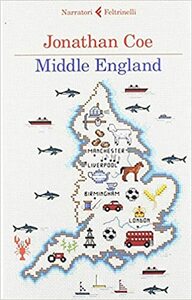You need to sign in or sign up before continuing.
Take a photo of a barcode or cover
challenging
funny
informative
reflective
medium-paced
Plot or Character Driven:
Plot
Strong character development:
Complicated
Loveable characters:
Yes
Diverse cast of characters:
Yes
reflective
medium-paced
Plot or Character Driven:
A mix
Strong character development:
Yes
Loveable characters:
Complicated
Diverse cast of characters:
Complicated
Flaws of characters a main focus:
Yes
dark
emotional
funny
medium-paced
Plot or Character Driven:
A mix
Strong character development:
Yes
Loveable characters:
Yes
Diverse cast of characters:
Yes
Flaws of characters a main focus:
No
Timely and necessary. A tale of Brexit Britain.
A novel that intertwines everyday lives with the realities of modern day Britain, viewed over the past decade and culminating with the Brexit referendum. An excellent story that sums up the mood and nature of a troubled Britain today.
A novel that intertwines everyday lives with the realities of modern day Britain, viewed over the past decade and culminating with the Brexit referendum. An excellent story that sums up the mood and nature of a troubled Britain today.
funny
informative
reflective
fast-paced
Plot or Character Driven:
Character
Strong character development:
No
Loveable characters:
Yes
Diverse cast of characters:
Yes
Flaws of characters a main focus:
Yes
Un roman qui aide à comprendre le vote des britanniques pour sortir de l'UE en 2019, au travers de l'histoire personnelle d'une famille et de leurs amis. L'auteur s'est attaché à brosser un tableau moderne de notre époque : repli identitaire, transgenre, le politiquement correct, ... On s'attache facilement aux personnages et les motivations de chacun sont bien détaillées. La pensée de l'auteur est finalement claire et on comprend pourquoi maintenant la désillusion des britanniques face au Brexit plébiscité pour de mauvaises raisons.
Il s'agit du dernier volume d'une trilogie qui suit cette famille mais il n'est pas nécessaire d'avoir lu les deux précédents.
Il s'agit du dernier volume d'une trilogie qui suit cette famille mais il n'est pas nécessaire d'avoir lu les deux précédents.
Far too heavy on historical and literary (the events of the two previous books) exposition, so much so that it reads like a Brexit-era Ready Player One... Nevertheless it was fun to share a final few hours with characters I've been following since The Rotter's Club, and there's something fun about reading about the grumbles of middle-class, middle-aged people. Best part of the book was the feud between the children's entertainers, though.
As I write, I lived almost exactly the first half of my life in the UK and the second half on 'the Continent'. I moved here in the year of the Maastricht treaty, when for the first time EU citizens gained the right to live and work all over the European Union. So it was with a mixture of fascinated horror and amazement that I have watched the UK (well, England) divorcing itself from the EU and breaking the trade and cultural links which have been formed over much of my lifetime. It felt almost like a traumatic experience, like a child watching its parents divorcing and the betrayal of important values. In a sense, this was not so unusual. Whilst I lived in Britain there were also plenty of times that the government did things that I was 100% opposed to. Nevertheless, the Brexit was a much more extreme example of that.
The question is, would Middle England help me to understand Brexit better, or even to come to terms with it?
Near to the end, Coe writes, "He [Benjamin] felt a pang of homesickness, both for the country he had grown up in and the country he had just left behind, even though these two countries were by no means the same". That was a phrase that resonated with me. I'm about the same age as Benjamin and what the book showed (helped by reading the first book in the trilogy, The Rotters Club, immediately beforehand) was that a lot of the changes were simply the changes that all societies undergo over time. The management and trade union conflicts of the 70s, with all the power cuts and unemptied bins, were also a feature of my childhood and despite all the insecurity of the gig economy, I don't think anyone would want to return to those working conditions.
Nevertheless, the book does explain nicely, by way of the development of the various characters, how certain politicians were able to manipulate people into believing that their ills were caused by immigration, fanning the flames of racism, and to take that further by framing the EU as being about allowing immigration. There are still aspects that I struggle to understand, like how people living in towns in the Northeast, which are entirely dependent on Japanese car manufacturers, were so supportive of a move which must inevitably mean that the car plant will close in the next decade.
The book is surprisingly hopeful. Two of the characters get divorced and Brexit had a lot to do with it. But in the end, they get back together again. How long will it take Britain to heal? That's hard to tell, the economic effects are only just beginning to kick in (cheese exports down 85%, I read in the paper today).
England today is not the England of The Rotters Club and nor is it the England I spent the first half of my life in. Middle England helps me to understand and perhaps even come to terms with that.
The question is, would Middle England help me to understand Brexit better, or even to come to terms with it?
Near to the end, Coe writes, "He [Benjamin] felt a pang of homesickness, both for the country he had grown up in and the country he had just left behind, even though these two countries were by no means the same". That was a phrase that resonated with me. I'm about the same age as Benjamin and what the book showed (helped by reading the first book in the trilogy, The Rotters Club, immediately beforehand) was that a lot of the changes were simply the changes that all societies undergo over time. The management and trade union conflicts of the 70s, with all the power cuts and unemptied bins, were also a feature of my childhood and despite all the insecurity of the gig economy, I don't think anyone would want to return to those working conditions.
Nevertheless, the book does explain nicely, by way of the development of the various characters, how certain politicians were able to manipulate people into believing that their ills were caused by immigration, fanning the flames of racism, and to take that further by framing the EU as being about allowing immigration. There are still aspects that I struggle to understand, like how people living in towns in the Northeast, which are entirely dependent on Japanese car manufacturers, were so supportive of a move which must inevitably mean that the car plant will close in the next decade.
The book is surprisingly hopeful. Two of the characters get divorced and Brexit had a lot to do with it. But in the end, they get back together again. How long will it take Britain to heal? That's hard to tell, the economic effects are only just beginning to kick in (cheese exports down 85%, I read in the paper today).
England today is not the England of The Rotters Club and nor is it the England I spent the first half of my life in. Middle England helps me to understand and perhaps even come to terms with that.
emotional
funny
hopeful
reflective
relaxing
medium-paced
Plot or Character Driven:
Character
Strong character development:
Yes
Loveable characters:
Yes
Diverse cast of characters:
Yes
Flaws of characters a main focus:
Yes
emotional
funny
relaxing
medium-paced







